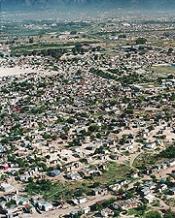- Overview
- Commonwealth initiatives
Regional and local government
 A variety of factors influence the way and the degree to which governance has been devolved to local, regional and state governments or assemblies in Commonwealth countries. They include but are not confined to geography, ethnicity, religion, history, constitutional changes and the British models of local government.
A variety of factors influence the way and the degree to which governance has been devolved to local, regional and state governments or assemblies in Commonwealth countries. They include but are not confined to geography, ethnicity, religion, history, constitutional changes and the British models of local government.
Religion and ethnicity
Historically, ethnicity and religion have played a significant role in shaping the delineation of not only nations but regions, districts and structures of local and regional government in the Commonwealth and beyond. During colonial rule governing along ethnic or religious lines was often viewed as conducive to the maintenance of peace, politically expedient and administratively efficient. Many such systems have persisted to this day for the betterment of some where they enhance peace and independence, and yet discord in others, providing the backdrop to marginalisation and inter-regional and inter-ethnic conflict.
British models of local government
For many years after their independence from the UK many Commonwealth countries retained the British model (of before 1980s privatisation) of local administration. The functions that are still carried out by local municipalities in many countries include water and electricity services, refuse removal, sewerage disposal, low cost-housing schemes, urban planning and traffic control. It is only since the 1990s that many of these services have been privatised.
Geography
Geography is important. Archipelago island states, for example The Bahamas, Solomon Islands, Kiribati and Vanuatu have devolved power to individual island councils. A small country in both area and population such as Nauru has no local or regional government, whereas larger populated countries such as Nigeria and India have 36 and 28 states respectively, composed of hundreds of council-run districts, towns and cities.
Constitutions
Of late, active constitutional or legislative changes have come to play a bigger role in decentralisation and delineation. Many countries have taken steps to constitutionally or legally protect or actively devolve power to regional or local administrations. In South Africa, post-apartheid, the 1996 constitution provided the underpinning of the country’s decentralisation programme which led to the formation of new provincial governments and more executive and legislative authority to mayors and local councils. In the UK three of the four countries that form the union, Northern Ireland, Scotland, and Wales now have power, to a variable extent, to legislate and execute many laws. London now (since 2000) has an executive mayor.
Commonwealth initiatives: CLGF

Established in 1995, the Commonwealth Local Government Forum (CLGF) is the most prominent Commonwealth organisation working in the area of local government today. The CLGF seeks to promote and strengthen effective democratic local government throughout the Commonwealth and to facilitate the exchange of good practice in local government structures and services. To date, it has more than 160 members in 40 Commonwealth countries including local government associations, local authorities, and ministries dealing with local government.


